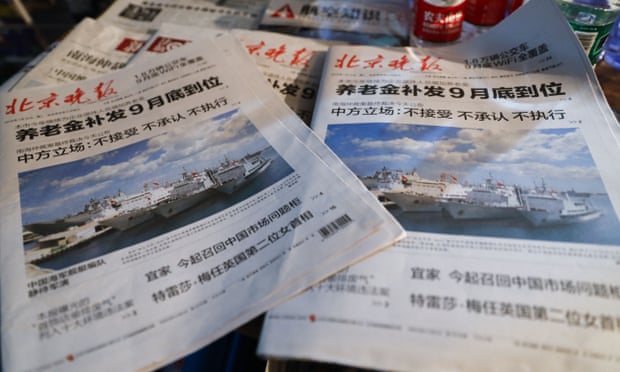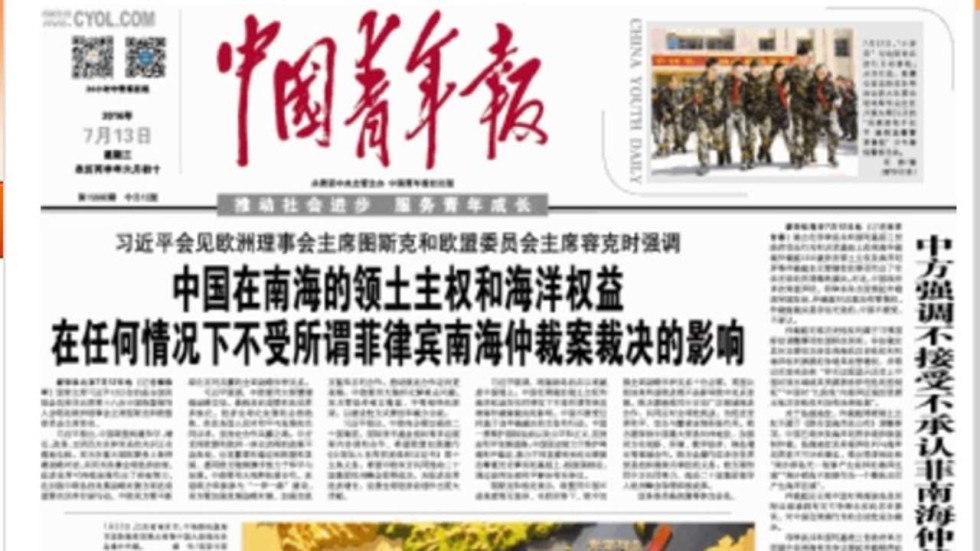China attacks international court after South China Sea ruling
Beijing warns of possible military escalation after UN tribunal overwhelmingly rejects its claims to ownership of strategic waterway




Beijing has criticised an international court’s stinging rejection of its territorial claims in the South China Sea, with Communist party-controlled newspapers warning of a military escalation in response to what they denounced as a US ploy to thwart China’s rise.
One day after a UN tribunal ruled overwhelmingly against Chinese claims to huge swaths of the strategically important waterway, Beijing rebuffed the verdict, calling it “a piece of paper that is destined to come to naught”.
In a 13,900-word white paper, Beijing claimed the Philippines, which brought the case, had “distorted facts, misinterpreted laws and concocted a pack of lies” in order to undermine Chinese interests.
The ruling against China had been based on “woefully weak pieces of evidence”, the white paper fumed, according to a copy of the textpublished by Xinhua, Beijing’s official news agency.
A front page commentary in the Communist party’s official mouthpiece, the People’s Daily, continued the offensive, dismissing the tribunal as “a lackey of some outside forces” that would be remembered “as a laughing stock in human history”.
“We do not claim an inch of land that does not belong to us, but we won’t give up any patch that is ours,” the newspaper said, adding: “China, of course, will not accept such downright political provocations.”
The China Daily, Beijing’s English-language mouthpiece, claimed the “outrageously one-sided ruling” meant military confrontation in the region had become more likely.
“With military activity reaching unprecedented levels in the South China Sea, there is no guarantee that an escalating war of words will not transform into something more,” it said.
The Global Times, a nationalist tabloid that is controlled by the People’s Daily and is known for its inflammatory rhetoric, was even more direct.
Further political or military pressure from the US – which Beijing has accused ofmasterminding the case against its claims in the South China Sea – would lead the Chinese people to “firmly support our government to launch a tit-for-tat counterpunch”, it warned.
Liu Zhenmin, China’s vice-foreign minister, said Beijing reserved the right to declare an air defence identification zone over the South China Sea.
“What we have to make clear first is that China has the right to ... But whether we need one in the South China Sea depends on the level of threats we face,” he said, adding that China hoped to return to bilateral talks with Manila.
“We hope that other countries don’t use this opportunity to threaten China, and hope that other countries can work hard with China, meet us halfway, and maintain the South China Sea’s peace and stability, and not turn the South China Sea in a source of war,” Liu said.
Bonnie Glaser, an Asia expert at Washington’s Center for Strategic and International Studies, said she expected an aggressive response from Beijing.
“It’s my view that this has been a real loss of face for Xi Jinping and that he will be under tremendous domestic pressure [to respond],” she said.
“I think [Xi] will see that the world is ganging up on China and he will believe that the United States has manipulated this ruling. I can’t see him compromising on this … I think in the final months of the Obama administration we could see some very assertive, destabilising actions by China.”
Nick Bisley, an international relations professor from La Trobe University in Melbourne, said that for all China’s frustration at the ruling he believed a military “counterpunch” was unlikely.
“Beijing will probably have been a little surprised by the extent to which it lost … [But] if you were going to get a really hot response from Beijing the first thing you would see is a manufactured protest saying ‘You have offended the feelings of the Chinese people’ and that doesn’t seem to be the case.”
Bisley said he did not envisage “a particularly provocative or reactive” response from China unless pressure from the US meant its leaders felt obliged to hit back to avoid looking weak before a domestic audience. “The real issue is that the regime doesn’t want to look bad internally.”
Washington’s initial response was cautious. “The world is watching now to see what these claimants will do,” state department spokesperson John Kirby said following the ruling. “The world is watching to see if China is really the global power it professes itself to be and the responsible power that it professes itself to be.”
Bisley said: “They are trying to keep a lid on it … there’s a shared understanding between the sensible heads in Beijing and in Washington that, whatever their differences of opinions about this dispute, it is in no one’s interests to have higher temperatures than necessary. That’s why on balance we are unlikely to see any big spike in the immediate aftermath of this.”
Bill Hayton, the author of South China Sea: The Struggle for Power in Asia, said the uncompromising rhetoric coming out of Beijing was to be expected.
“I think what is going on here is public opinion management,” he said. “They’ve suffered a reverse. They have to scream and shout and stamp their feet.”
Speaking in Washington, China’s ambassador to the US, Cui Tiankai, warned that the ruling would “certainly intensify conflict and even confrontation”.
But Hayton said he believed such rhetoric belied the fact that Beijing would now attempt to defuse the situation in the South China Sea after so many of its claims there were ruled “completely incompatible with the law”.
“I think the bluster disguises a deliberate attempt by China to try and move closer to international law,” he said. “But they can’t do it in one step.”
No comments:
Post a Comment
Comments always welcome!